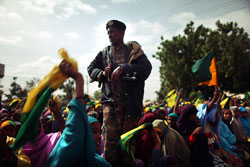Understanding Strategies to Address Corruption in Conflict-Affected Countries
This is event discussed the linkages between corruption and conflict affected states, the panel presented strategies to address corruption that are conflict-sensitive and peacebuilding.
 According to Transparency International’s 2010 Corruption Perceptions Index, countries experiencing or emerging from conflict are among the most corrupt. The bottom-ranked countries in the survey are Somalia, Burma/Myanmar, Afghanistan and Iraq. This is partly because of the pervasive effects of the conflict economy and partly because of the breakdown of governing institutions, which leads to impunity. The resultant corruption frustrates efforts at post-conflict reconstruction, undermines the development of effective governance structures and imposes huge costs on all citizens --- particularly the most vulnerable. It is clear that unless corruption is fully understood, addressed and drastically reduced both national resources and foreign assistance flows will fail to promote peace, and the worsening inter-group tensions could eventually re-ignite violent conflict.
According to Transparency International’s 2010 Corruption Perceptions Index, countries experiencing or emerging from conflict are among the most corrupt. The bottom-ranked countries in the survey are Somalia, Burma/Myanmar, Afghanistan and Iraq. This is partly because of the pervasive effects of the conflict economy and partly because of the breakdown of governing institutions, which leads to impunity. The resultant corruption frustrates efforts at post-conflict reconstruction, undermines the development of effective governance structures and imposes huge costs on all citizens --- particularly the most vulnerable. It is clear that unless corruption is fully understood, addressed and drastically reduced both national resources and foreign assistance flows will fail to promote peace, and the worsening inter-group tensions could eventually re-ignite violent conflict.
Sharing experiences from Afghanistan and Iraq, the panelists will consider the following questions: Is endemic corruption inevitable in conflict-affected states? How are corruption and violent conflict linked? What strategies have worked, or are likely to work, in conflict-affected states? How do we measure progress with anti-corruption initiatives?
Speakers
- Frank Gunter
Associate Professor, Economics at Lehigh University and former Economic Advisor to the US-led multi-national forces in Iraq - Lorenzo Delesgues
Director, Integrity Watch Afghanistan and co-director of IWA corruption surveys in Afghanistan - Michael Dziedzic, Moderator
Senior Program Officer, Center for Post-Conflict Peace and Stability Operations, US Institute of Peace
Explore Further
- Read Frank Gunter's presentation on Anti-Corruption Strategies in Post-Conflict Iraq.
- Read Lorenzo Delesgues's presentation on Corruption and Conflict in Afghanistan.



